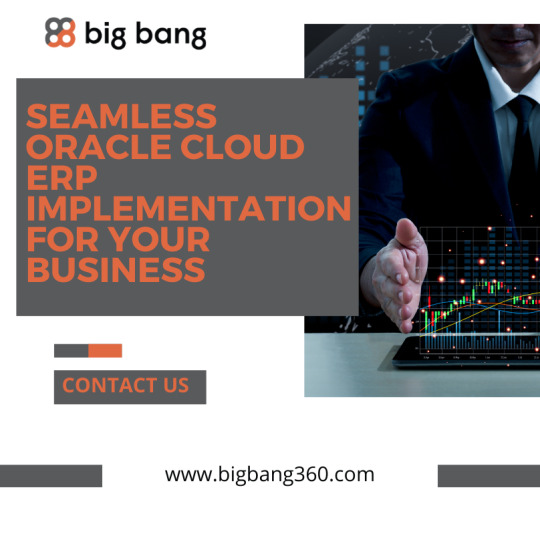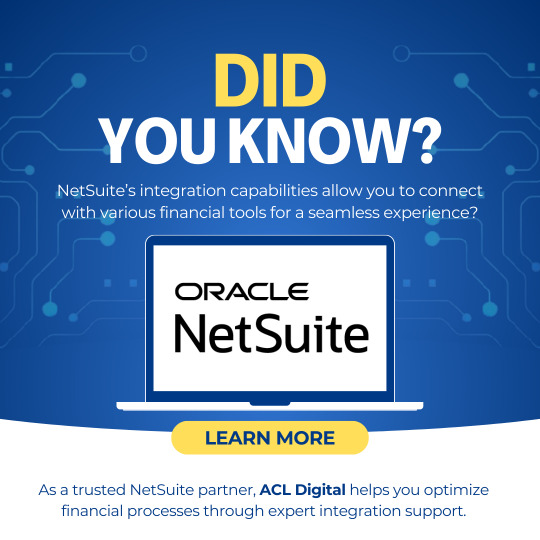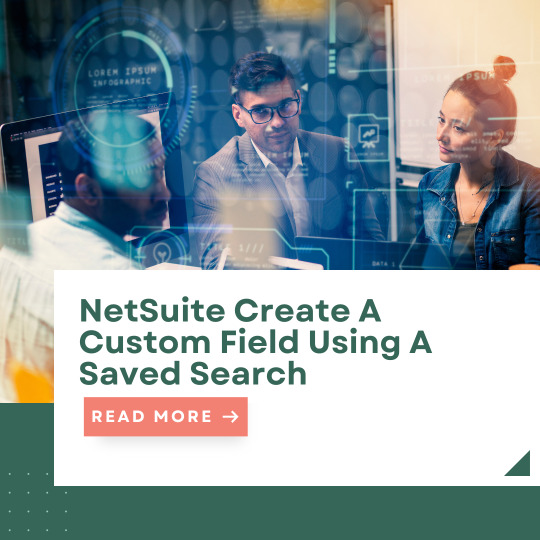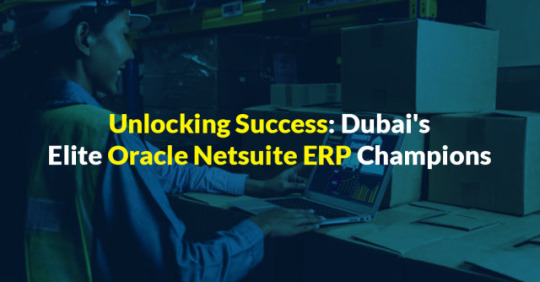#oracle erp implementation
Explore tagged Tumblr posts
Text
How NetSuite Cloud ERP Decodes Modern Billing Complexity?

Picture this: you’re billing a client for a SaaS subscription that includes a one-time setup fee plus per-usage API calls, all packaged as one invoice. This is not merely an imagination for India’s services sector. The revenue models are actually mutating. Legacy ERP systems shatter under such pressure and force finance teams to battle with juggling spreadsheets, manual entries, and guesswork. Oracle NetSuite Cloud ERP is not just another tool. It is imperative to the billing processes that need to thrive in the non-linear economy. It provides an absolute DNA rewrite.
The Pitfalls of One-Size-Fits-All Billing
IT services and logistics, healthcare, and financial services are also part of Indian businesses adopting hybrid revenue models.
Subscription + usage: Bengaluru SaaS firm bills clients for data quota as well as a monthly fee.
Milestones + retainers: Mumbai law firm bills clients for milestones achieved along with ongoing advisory retainer fees.
Outcome-based pricing: Delhi-based consultancy bills based on the ROI metric tied to the project.
These sophisticated forms of invoicing are now becoming eerily standard in many industries. However, traditional enterprise resource planning software perennially treats these models as exceptions and not the norm. Finance teams put together invoices using inefficient, cobbled-together solutions prone to errors, significant delays, and even client disputes.
3 - Billing Issues and Tackle Complexity Head On
1. Blended Billing Freedom
Using a combination of subscription, usage, and project-based constituents to create one single invoice is much more than difficult. It is a compliance nightmare and fraught with danger. Oracle NetSuite ERP helps straddle these hybrids.
E-classroom platforms offer courses, admit term qualifications (subscriptions), one-off certification, and allow retake attempts (usage). Leading to a demand for accuracy.
Subscription Cycles: Enrollments with prorated captures for mid-cycle upgrades self-adjust.
Usage tracking: Billed API calls, storage, or transaction volumes are captured directly within the invoices.
Milestone triggers: Automatic billing of clients when predetermined phases of projects hit expected KPIs is available.
Gone are the days of calculation-related drudgery or inaccurate revenues and expenditures being reported.
2. Compliance Innocently Integrated During Transactions
The mixed billing procedure under India’s GST discipline is a complex formula.
Relevant tax rates can be pre-recorded as being auto-applied based on definition per certain specific service or product.
GST-approved invoices can be created along with listed accounts and itemized summary parts of the invoices.
A maximum of three incredibly rigid CA audit satisfactions can be alongside available surveillance history.
For every invoice that is created, compliance can feel like having a billing professional integrated.
3. Real-Time Revenue Recognition
ASC 606 and Ind-AS 115 require specific revenue allocation to be accurately split across deliverables. Kochi logistics firms giving bundled services such as warehousing and analytics must split revenue accurately. Oracle NetSuite Cloud ERP does this dynamically:
Monetize as a milestone is hit or usage is accrued.
Unearned revenue is deferred automatically.
Compliance-controlled reports can be generated for audit or investment queries.
From the CFO’s perspective, this is not convenient. It’s a life-and-death scenario.
Why NetSuite Trumps Legacy Billing Tools?
Broad ERP Solutions makes it a requirement that companies contort to their limits. Oracle NetSuite Cloud ERP contorts to yours:
Single Pricing Catalogs: Centralize management of subscription plans, fees, and usage tiers into one catalog.
Support for Global Currencies: Bill in the following INR, USD, and EUR while reconciling with your base currency.
Configuring India First: GST, TDS, and e-invoicing are baked into workflows.
NetSuite has made the world incredibly easy, while their competitors continue tripping over their self-built walls.
Billing Complexity Isn’t a Problem—It’s an Opportunity
For Indian service providers, having the agility to bill is not merely a business advantage; it is strategic to their very existence. NetSuite Cloud ERP has always been a vital tool for businesses aiming to stay competitive in today’s fast-changing market. SoftCore Solutions proudly holds the distinction of being one of the best Oracle NetSuite Cloud ERP partners in India. Oracle NetSuite Cloud ERP has redefined billing by automating billing tasks into a strategic tool that increases client loyalty and cash flow. Businesses of the future will rely on aggressive billing strategies rather than timid ones.
Frequently Asked Questions
1. How does NetSuite manage GST on complex billing models?
NetSuite applies appropriate GST tax for each line item, charged based on their type, ensuring compliance with regulations.
2. Is NetSuite useful for startups with changing pricing?
NetSuite can support these changes. Start with a basic system and implement more ERP modules as the business grows.
3. Does NetSuite support integration with third-party usage trackers?
Yes. APIs allow connection to IoT devices, APIs, or custom meters to provide real-time data.
4. Where do Indian businesses go to get support for NetSuite billing?
Work with NetSuite partners based in India to customize implementation.
5. Am I allowed to combine subscription services with selling products?
Yes. Oracle NetSuite Cloud ERP automates billing and reporting, consolidating recurring and one-time charges to streamline customer invoicing.
#netsuite implementation#Oracle NetSuite Cloud ERP#Oracle NetSuite Cloud ERP Partners in India#NetSuite Cloud ERP#NetSuitePartners in India
0 notes
Text
Navigating the Complexities of NetSuite Implementation: Overcoming ERP Challenges
Implementing a robust ERP system like Oracle NetSuite can be transformative for businesses seeking smooth operations and improved efficiency. However, the journey to a successful NetSuite implementation is often riddled with challenges that require strategic planning and expert execution. The blog "8 Key Challenges in NetSuite Implementation: What to Anticipate" by Entartes dives deep into these hurdles, providing insights to help organizations prepare and navigate their way effectively.
Here’s an overview of the essential points from the blog, highlighting common ERP implementation challenges and how businesses can anticipate and address them.
Understanding the Core Challenges
Inadequate Planning and Requirement Gathering One of the primary challenges in Oracle NetSuite implementation is the lack of a clear roadmap. Businesses often underestimate the importance of detailed requirement analysis, leading to gaps between what is implemented and what is actually needed. Without proper planning, organizations risk misalignment between the ERP system and their operational goals.
Data Migration Complexities Migrating existing data into NetSuite is another significant hurdle. Businesses face issues with data quality, formatting, and compatibility, which can delay implementation timelines. Ensuring data accuracy and integrity is crucial to prevent operational disruptions.
Customization vs. Standardization NetSuite is highly customizable, but excessive customization can make the system complex and harder to manage. Balancing the need for tailored functionalities with standard practices is a common ERP implementation challenge.
Change Management and User Adoption Introducing a new ERP system like NetSuite often meets resistance from employees who are accustomed to existing processes. Proper training and a change management strategy are critical to ensure smooth adoption across all departments.
Integration with Existing Systems Integrating NetSuite with other legacy systems is a technical challenge that demands expertise. Businesses need to ensure smooth communication between systems to avoid operational silos.
Budget Overruns ERP implementations, including NetSuite, can exceed initial budget estimates due to unforeseen complexities or lack of precise scope definition. Having a realistic budget and contingency plans is essential.
Vendor Selection and Collaboration Choosing the right implementation partner can make or break the project. Working with an experienced vendor like Entartes ensures access to proven methodologies and industry expertise, minimizing risks and delays.
Post-Implementation Support The journey doesn’t end with implementation. Continuous support and optimization are essential to maximize the benefits of NetSuite. Lack of post-implementation support can lead to inefficiencies and missed opportunities for improvement.
Strategies to Overcome Challenges
To address these challenges effectively, businesses should:
Invest in Planning: Allocate sufficient time and resources to requirement gathering and project scoping.
Ensure Data Readiness: Conduct thorough data cleansing and validation before migration.
Prioritize Training: Provide comprehensive training to employees to enhance user adoption.
Collaborate with Experts: Partner with experienced vendors like Entartes to leverage their expertise in NetSuite implementation and industry best practices.
Adopt Agile Methodologies: Break the project into manageable phases for better control and flexibility.
Why Choose Entartes for NetSuite Implementation Entartes stands out as a trusted partner for businesses embarking on their Oracle NetSuite implementation journey. Their team of experts ensures a smooth transition, addressing specific business needs while mitigating risks. With their proven track record and client-focused approach, Entartes helps organizations unlock the full potential of NetSuite.
Final Thoughts ERP systems like Oracle NetSuite are indispensable for modern businesses, but the road to successful implementation is not without its challenges. By understanding and preparing for the common ERP implementation challenges, organizations can position themselves for success. Whether it’s planning, integration, or user adoption, having the right strategies and partners makes all the difference.
#netsuite implementation#netsuites software#erp implementation challenges#netsuite implementation guide#oracle netsuite implementation#erp implementation issues#netsuite implementations#erp implementation issues and challenges
0 notes
Text

Seamless Oracle Cloud ERP Implementation for Your Business
Experience seamless Oracle Cloud ERP implementation for your business with Big Bang's expert cloud implementation services. Our team specializes in Oracle Cloud ERP, providing comprehensive solutions to streamline your business processes and enhance efficiency. With Big Bang's cloud implementation services, you can ensure a smooth transition to Oracle Cloud ERP, leveraging its powerful features to drive growth and success. Trust Big Bang's expertise to deliver a tailored implementation strategy that meets your unique business needs and sets you up for long-term success.
0 notes
Text

Ready to take your business to new heights? Dive into the world of NetSuite ERP and watch your business growth! Explore our services: https://lnkd.in/gMN-MXE6 Contact: +91 9035705428
#netsuite implementation partner#netsuite crm#netsuite data migration#netsuite customization#erp software#erp#cloud erp#netsuite erp implementation#erpsolutions#datatransformation#digitaltransformation#oracle#cloudcrm
0 notes
Text
NetSuite customization
NetSuite customization involves tailoring the NetSuite platform to fit the unique needs and requirements of a business. This customization can range from simple changes to complex modifications, and it typically involves leveraging NetSuite's suite of tools and technologies. Here's an overview of the key aspects of NetSuite customization:
SuiteBuilder: SuiteBuilder is NetSuite's suite of tools for customizing the platform's user interface. It allows users to modify forms, fields, lists, records, and workflows without writing any code. With SuiteBuilder, users can add custom fields, create custom record types, customize page layouts, and define custom workflows to automate business processes.
SuiteScript: SuiteScript is NetSuite's JavaScript-based scripting language that allows developers to extend and customize the functionality of NetSuite. With SuiteScript, developers can create custom scripts to automate tasks, customize business logic, and integrate NetSuite with external systems. SuiteScript supports both client-side and server-side scripting, and it provides access to NetSuite's SuiteAPI for interacting with NetSuite data and functionality.
SuiteFlow: SuiteFlow is NetSuite's graphical workflow management tool that allows users to create custom workflows to automate business processes. With SuiteFlow, users can define workflows using a drag-and-drop interface, specifying conditions, actions, and triggers to automate tasks such as approvals, notifications, and data updates.
SuiteTalk: SuiteTalk is NetSuite's SOAP-based web services API that allows developers to integrate NetSuite with external systems and applications. With SuiteTalk, developers can perform operations such as creating, reading, updating, and deleting NetSuite records, as well as executing custom scripts and workflows. SuiteTalk supports a wide range of programming languages and platforms, making it easy to integrate NetSuite with third-party systems.
SuiteCommerce Advanced (SCA): SuiteCommerce Advanced is NetSuite's e-commerce solution that allows businesses to create custom online shopping experiences. With SuiteCommerce Advanced, businesses can customize the look and feel of their online store, as well as integrate with back-office systems such as inventory management, order fulfillment, and customer service.
SuiteCloud Development Framework (SDF): SuiteCloud Development Framework (SDF) is NetSuite's development platform that provides tools and resources for building, deploying, and managing customizations on the NetSuite platform. SDF includes features such as version control, deployment automation, and developer tools for managing customizations across multiple environments.
By leveraging these customization tools and technologies, businesses can tailor the NetSuite platform to meet their specific needs and requirements, thereby maximizing its value and effectiveness for their organization. Let me know if you'd like more information on any specific aspect of NetSuite customization!
No 1 NetSuite solution provider in India
0 notes
Text
Nijatech: A Premier Choice Among ERP Consulting Companies in Dubai
In the vibrant landscape of Dubai's business sector, where efficiency and innovation are paramount, selecting the right Enterprise Resource Planning (ERP) consulting firm can significantly impact an organization's success. Among the myriad of options available, Nijatech stands out as a trusted partner for businesses seeking comprehensive ERP solutions tailored to their unique needs.
Established with a commitment to excellence and driven by a passion for empowering businesses, Nijatech has emerged as a premier player in the realm of ERP consulting in Dubai. With a proven track record of delivering transformative ERP implementations, the company has garnered a reputation for reliability, expertise, and customer-centricity.
Here are some compelling reasons why Nijatech shines as a leader among ERP consulting companies in Dubai:
1. Expertise Across Industries: Nijatech boasts a team of seasoned professionals with diverse industry backgrounds and extensive expertise in ERP systems. Whether it's manufacturing, retail, construction, hospitality, or any other sector, Nijatech's consultants possess the domain knowledge necessary to understand the intricacies of each business and devise tailored ERP solutions.
2. Comprehensive Solutions:Recognizing that one size does not fit all, Nijatech takes a consultative approach to understand each client's unique requirements, challenges, and goals. Leveraging this insight, the company offers end-to-end ERP solutions encompassing implementation, customization, integration, training, and support services. From selecting the right ERP platform to optimizing business processes, Nijatech ensures a seamless journey towards digital transformation.
3. Cutting-Edge Technologies: In a rapidly evolving technological landscape, Nijatech remains at the forefront by staying abreast of the latest innovations in ERP software. Whether it's cloud-based solutions, AI-driven analytics, or IoT integration, the company harnesses cutting-edge technologies to empower businesses with scalable, future-ready ERP systems that drive efficiency, agility, and competitiveness.
4. Client-Centric Approach: At Nijatech, client satisfaction is paramount. The company places a strong emphasis on building long-term partnerships based on trust, transparency, and responsiveness. From initial consultation to post-implementation support, Nijatech's dedicated team ensures that clients receive personalized attention and prompt resolution of any issues or concerns.
5. Proven Track Record: With a portfolio of successful ERP implementations across diverse industries, Nijatech has earned the trust of numerous satisfied clients. The company's testimonials and case studies bear testimony to its ability to deliver tangible results, such as increased productivity, streamlined operations, enhanced decision-making, and improved customer satisfaction.
6. Global Reach, Local Presence: While Nijatech boasts a global outlook, the company maintains a strong local presence in Dubai, allowing for seamless communication, cultural understanding, and on-the-ground support. This combination of global expertise and local insight enables Nijatech to effectively navigate the nuances of the Dubai business landscape and deliver tailored ERP solutions that drive sustainable growth and success.
In conclusion, Nijatech stands out as a top choice among ERP consulting companies in Dubai, thanks to its expertise, comprehensive solutions, cutting-edge technologies, client-centric approach, proven track record, and global-local synergy. For businesses seeking to unlock their full potential through digital transformation, Nijatech remains a trusted partner dedicated to driving success in the dynamic business environment of Dubai and beyond.
0 notes
Text
Expert in NetSuite Implementation cost, NetSuite Implementation Company.
1 note
·
View note
Text
1 note
·
View note
Text
Oracle Cloud ERP: Benefits, Challenges and best practices in Implementation - CloudShine

Want to know what the benefits of using Oracle Cloud for Business are and how an Oracle Fusion ERP implementation can be challenging? Read on to find out.
0 notes
Text

Using a saved search, you can construct a custom field in NetSuite to dynamically display particular data from your database. In order to make the desired data easily accessible and visible, this procedure entails creating a saved search that extracts the needed information and attaching it to a custom field. By streamlining data administration and reporting, this effective technique enables users to make deft judgments based on the information acquired from their customized fields. Read More: https://www.intelvue.com/netsuite-create-a-custom-field-using-a-saved-search/
#netsuite#erp#erp software uae#erp implementation#erp systems#salesforce#business consulting#school management software#automation#erpsoftware#sapporo#cloud computing#sapconsultant#software#software engineering#startup#crm software#oracle
0 notes
Text
Effortlessly Manage Recurring Revenue with NetSuite Cloud ERP

The adoption of subscriptions and recurring revenue models has affected almost every modern business in one way or another. From SaaS platforms, media companies, and professional services, income streams that can be predicted have become the new treasure for financial security. Unfortunately, most legacy systems were never designed to deal with modern billing cycle complexities, usage-based pricing, or automated renewals.
Oracle NetSuite Cloud ERP is positioned to bridge that gap. This sophisticated enterprise resource planning system does not only track transactions but also manages the entire customer lifecycle, actively transforming billing operations from a tactical necessity into a competitive advantage.
1. Flexible Billing for Every Business Model
The good thing about recurring revenue is the convenience that comes along with it. However, that very convenience can be a nightmare in itself without the right tools. Oracle NetSuite Cloud ERP can deal with everything from simple monthly subscriptions to much more complex hybrids that include fixed fees and usage-based components. Take, for example, the case of a software company that needs to bill some customers annually, while other customers are billed quarterly, and there are some who require variable rates based on API calls or storage usage. Traditional accounting systems fail under such strain, but NetSuite excels at it.
2. Subscription Management That Actually Scales:
Managing subscribers can be described as a delicate interplay between insight and precision. NetSuite Cloud ERP handles the proactive revenue optimization of subscriber management, turning reactive firefighting into a streamlined process. The system goes beyond merely accepting payments—it offers a holistic vantage point of all customer relationships. NetSuite flags high-value clients who are in danger of churning before it becomes an issue. It alerts subscription services to offer potential upsells to customers who continuously max out their limits. This level of intelligence for rapid growth businesses is crucial in achieving successful scale rather than drowning in operational complexity.
3. Focus on Royalty and Licensing Management:
Like in the media industry, software development and content platforms also face difficulties managing royalties and licensing fees. The myriads of contracts, their differing terms, payment schedules, and complex profit-sharing formulas create an intricate network of financial responsibilities that is nearly impossible to keep track of manually. Oracle NetSuite Cloud ERP provides a solution for all these headaches. Even more importantly, content creators and partners receive precise payments for their contributions on schedule - improving business relations. If a company’s most precious asset is their intellectual property, there is no suitable alternative to his level of financial clarity.
4. Unified Financials: From Billing to Revenue Recognition:
Ensuring compliance isn’t simple, as miscalculations at this stage can lead to restatements, audits, and loss of investor trust. NetSuite Cloud ERP simplifies compliance at every level by automating deferred revenue, revenue allocation, and amortization schedule management over multiple reporting periods. For publicly traded companies or those looking to go public, convenience matters less than avoiding dire financial threats using compliance regulations that protect investors and regulators.
5. What Makes NetSuite Unique Among Others in the ERP Industry:
Among all enterprise resource planning systems, Oracle NetSuite Cloud ERP sits atop the competition for its inherent grasp of businesses with subscription models. While other systems slap on subscription handling as an afterthought, NetSuite was designed from the ground up to manage the complexities of modern business models. Perhaps most importantly, NetSuite adapts to your business growth, managing everything from a startup's first hundred subscribers to an enterprise with millions of customer relationships. Connecting to an always-changing business world is easier with an ERP system without costly tailoring, and NetSuite stands out among the rest.
In our time, one of the most important changes in business is the shift to recurring revenue models. However, none of this is possible without effort. Oracle NetSuite Cloud ERP Systems will change the situation by automating key processes like billing, customer management, and finances, transforming the concept of recurring revenue into a real competitive advantage. SoftCore Solutions, proudly recognized as one of the best Oracle NetSuite Cloud ERP partners in India, further cements this.
FAQs
1. Can NetSuite handle complex subscription tiers?
Careful management of complex subscription tiers is NetSuite’s strong suit. It fully supports simple and flat-rate subscriptions as well as more hybrid systems with fixed, usage-based, and tiered pricing.
2. Does NetSuite adhere to the revenue recognition standards?
The system inherently complies with ASC 606 and IFRS 15 by automating revenue allocation for different time periods and preserving detailed audit trails for effortless financial reporting and auditing.
3. Where can I search for NetSuite specialists in India?
In addition to Oracle, you can search for local implementation gurus using the network of authorized NetSuite partners in India, as these offer training and ongoing maintenance tailored to your business.
0 notes
Text
Overcoming Common Challenges in Oracle NetSuite ERP Implementation
Implementing an ERP system like Oracle NetSuite is a significant milestone for any organization, promising effective operations and a consolidated view of data across departments. By integrating finance, inventory, customer management, and more, NetSuite allows businesses to operate more efficiently and make data-driven decisions. However, as powerful as NetSuite software is, its implementation brings a unique set of challenges that can impede the project if not anticipated. In this article, we’ll explore the most common issues organizations face when implementing Oracle NetSuite and highlight considerations to keep your project on track.
Defining Clear ERP Goals and Requirements
A well-defined goal is important to any ERP project, and with NetSuite, understanding and documenting clear objectives is particularly crucial. Often, organizations move forward with a broad vision of what they want from NetSuite but lack specific, measurable goals. This lack of clarity can lead to scope delays, and unmet expectations.
Defining the project’s scope involves not only setting organizational goals but also considering each department's needs. Without this detailed input, there’s a risk of developing a system that meets only partial requirements, necessitating costly reworks or customizations down the line. Departments may have varied expectations, and aligning these into one cohesive project scope requires extensive coordination early on.
Data Migration and Quality Management
Data migration is another frequent challenge in Oracle NetSuite implementation. Most companies have a considerable amount of data spread across various legacy systems, from customer records and financials to product and inventory data. Transferring this data into a new system without compromising its accuracy or relevance is complex, especially if data management practices have been inconsistent over the years.
Common issues include duplicate records, outdated information, or missing fields, all of which can result in problems when integrated into NetSuite. These inconsistencies, if not addressed before migration, can complicate the new system’s functionality, leading to errors, inefficiencies, and potential financial impacts. Ensuring data quality from the beginning is essential, but it requires thorough analysis, cleaning, and possibly significant adjustments to data management practices.

System Integration Challenges
While NetSuite provides comprehensive ERP capabilities, most organizations rely on additional tools or platforms for specific functions, whether it’s a CRM, logistics software, or production management system. Integrating these with NetSuite can be a daunting task. Without seamless integration, businesses run the risk of creating data silos, which can lead to inaccuracies, duplicated efforts, and slow processes.
Managing the complexity of multiple systems, each with its own data formats and workflows, is challenging. Further complicating the situation, legacy systems may not have built-in integration capabilities, requiring custom development or third-party middleware. Without a well-planned approach to integration, organizations might find themselves dealing with inconsistent data across systems or manually entering data, which could slow down operations and reduce NetSuite’s effectiveness.
Customization Complexity
NetSuite software is designed to be adaptable, offering customization options that let businesses tailor the ERP to their unique needs. While flexibility is an asset, excessive customization can backfire. Complex customizations can extend implementation timelines and introduce new risks, including compatibility issues when NetSuite software updates are rolled out.
Additionally, the more customized the solution, the harder it may become to maintain and update. This complexity can create a reliance on specific developers who understand the customizations, making it more challenging to troubleshoot or evolve the system over time. Balancing customization with simplicity is key, as excessive custom development can undermine the scalability and stability of the system.
Managing Change and Employee Training
An ERP system, especially one as comprehensive as Oracle NetSuite, brings significant changes to how employees handle day-to-day tasks. However, many organizations overlook the human side of implementation, focusing heavily on technical aspects while neglecting change management. When employees are unprepared or uncomfortable with the new system, adoption rates suffer, productivity declines, and user errors increase.
Resistance to change is a natural response, particularly if employees don’t see the value of the new system or feel unprepared to use it effectively. Without adequate training and engagement, employees may revert to old methods, undermining the investment in NetSuite. A structured approach to training is essential, ensuring that each department understands how NetSuite benefits their roles and feels equipped to use the software confidently.
Budget Management and Cost Overruns
ERP implementations often exceed budget expectations, and Oracle NetSuite implementation is no exception. Underestimating the financial resources required for implementation, training, customization, and data migration can strain budgets. As the project progresses, unexpected expenses can accumulate, whether from additional software needs, extended timelines, or unforeseen integration complexities.
Budget overruns can also result from poorly defined project scopes that expand over time, requiring extra resources. Companies need to plan for contingencies, as many issues, like additional training needs or technical setbacks, may arise during the implementation. Costly surprises can ultimately impact the project’s return on investment, making careful financial planning essential.
Ensuring Performance and Scalability
Oracle NetSuite is a powerful tool, but as a business grows, so do the demands on the ERP system. It’s essential to consider the future scalability of the ERP during the implementation phase to avoid performance bottlenecks later on. Without a long-term view, companies may find that the setup, while adequate now, lacks the capacity to support increased workloads or additional users as they expand.
If the system isn’t configured to accommodate anticipated growth, issues may arise as operations expand, requiring further adjustments or costly upgrades. Scalability concerns should be addressed during initial configuration to ensure that NetSuite continues to perform well as business demands increase. This includes considering not only user volumes but also the potential need for additional functionalities.
Post-Implementation Support and Continuous Improvement
After the system goes live, organizations often face a new set of challenges. Employees encounter real-world scenarios and discover potential gaps or inefficiencies in the system’s setup. Without adequate post-implementation support, these issues can lead to frustration, workarounds, and decreased productivity.
ERP implementation doesn’t end at the go-live date. There’s a need for continuous monitoring, assessment, and improvement to keep the system aligned with business needs. Establishing a framework for ongoing support ensures that issues are promptly addressed, and regular updates and improvements can help keep NetSuite performing optimally as the business evolves.
Final Thoughts
Oracle NetSuite implementation is a complex yet rewarding endeavor that requires thorough planning, attention to detail, and a proactive approach to potential challenges. By understanding and preparing for these common hurdles, companies can maximize their ERP investment, ensuring a smoother transition and a more effective system. Whether it’s managing data quality, optimizing system performance, or ensuring user adoption, anticipating these challenges helps organizations make the most of NetSuite’s powerful capabilities and set a strong foundation for future growth.
0 notes
Text
#business#erp software#crm#cloudcomputing#cloud erp#netsuite implementation partner#netsuite data migration#netsuite customization#netsuite crm#oracle#ai
1 note
·
View note
Text
NetSuite Implementation
Introduction: In today's fast-paced business landscape, companies are constantly seeking ways to enhance efficiency, streamline operations, and gain a competitive edge. Enter NetSuite, a cloud-based enterprise resource planning (ERP) system that offers a comprehensive suite of applications to manage various aspects of a business, from financials and customer relationship management (CRM) to e-commerce and beyond. Implementing NetSuite can be a game-changer for organizations, but it requires careful planning and execution. This article serves as a comprehensive guide to navigate the NetSuite implementation process successfully.
1. Understanding Business Needs: Before diving into NetSuite implementation, it's crucial to assess your organization's unique requirements and objectives. Conduct a thorough analysis of current processes, pain points, and areas for improvement. Engage stakeholders from different departments to gather insights and ensure alignment with business goals. This step lays the foundation for a tailored NetSuite solution that addresses specific needs and delivers maximum value.
2. Selecting the Right NetSuite Partner: Choosing the right implementation partner is paramount to the success of your NetSuite project. Look for certified NetSuite solution providers with a proven track record of successful implementations across industries. Evaluate their expertise, industry experience, and client testimonials to gauge their suitability. Collaborating with a reputable partner ensures access to expert guidance, best practices, and ongoing support throughout the implementation journey.
3. Planning and Preparation: Effective planning is key to a smooth NetSuite implementation. Develop a comprehensive project plan outlining key milestones, timelines, resource allocation, and dependencies. Define roles and responsibilities for internal teams and external vendors, fostering clear communication and accountability. Conduct data cleansing and migration activities to ensure accuracy and integrity within the NetSuite system. Establish training programs to familiarize users with the new platform and facilitate adoption.
4. Configuration and Customization: NetSuite offers extensive customization capabilities to tailor the system to your organization's unique requirements. Work closely with your implementation partner to configure workflows, dashboards, and reports that align with specific business processes. Leverage SuiteBuilder and SuiteFlow tools to customize fields, forms, and workflows without extensive coding. Implement integrations with third-party applications to seamlessly connect disparate systems and streamline data flow.
5. Testing and Quality Assurance: Thorough testing is essential to validate the functionality, usability, and performance of the NetSuite implementation. Conduct comprehensive testing across different modules, scenarios, and user roles to identify any issues or discrepancies. Utilize sandbox environments to simulate real-world scenarios and mitigate risks before deploying changes to the production environment. Engage end-users in user acceptance testing (UAT) to gather feedback and ensure alignment with expectations.
6. Deployment and Go-Live: With thorough planning and testing complete, it's time to deploy the NetSuite solution and go live. Coordinate closely with internal teams and external stakeholders to execute the deployment plan effectively. Provide adequate support and training resources to assist users during the transition period. Monitor system performance and address any issues promptly to minimize disruptions to business operations. Celebrate the successful launch of NetSuite and acknowledge the collective effort of everyone involved.
7. Ongoing Support and Optimization: NetSuite implementation doesn't end with the go-live phase; it's an ongoing journey of continuous improvement. Establish channels for feedback and support to address user inquiries, enhancement requests, and technical issues post-implementation. Leverage NetSuite's regular updates and releases to stay abreast of new features and functionalities. Continuously evaluate system performance, user adoption, and business outcomes to identify opportunities for optimization and refinement.
Conclusion: NetSuite implementation is a strategic investment that empowers organizations to streamline operations, drive growth, and stay competitive in today's dynamic business environment. By following the comprehensive guide outlined in this article, businesses can navigate the implementation process effectively and unlock the full potential of NetSuite to achieve their goals. With the right planning, partnership, and commitment to continuous improvement, success with NetSuite is within reach.www.jobinandjismi.com
#netsuite implementation partner#netsuite solution provider partner#netsuite customization#cloud erp#oracle netsuite
1 note
·
View note
Text

0 notes
Text
Why Infor SyteLine ERP Is Ideal for Mid-Market Manufacturers & Service Providers

When electronics and other mid-market manufacturers want their ERP system to enable growth and create a new competitive advantage, they rely upon Infor Infor SyteLine, also known as CloudSuite Industrial (CSI).
When service and rental equipment providers want their ERP system to enable their growth into world-class service organizations and empower field technicians with data at their fingertips, they also rely upon Infor Infor SyteLine CSI.
We’ve all heard the horror stories of failed ERP implementations so, when manufacturers and service providers want SyteLine ERP successfully implemented—and guaranteed—they rely upon Bridging Business Technology Solutions (BBTS).
An ERP Ideal for Manufacturers
Infor SyteLine is the primary ERP we support because it’s ideal for use by discrete and process manufacturers, especially electronics manufacturers. We also guarantee the success of your Infor SyteLine implementation whether you’re commissioning an ERP system for the first time or replacing your current system, so you can cross the risk of a failed implementation off your list of worries.
SyteLine also can be customized to recognize customer-owned inventory and allocate it only to that customer so you don’t have a unique part number for the same part used by multiple customers. You can also reserve stock for specific products of the same customer or reserve any part in your inventory for a specific order until the order is released.
SyteLine delivers the same type of functionality as SAP and Oracle for a fraction of the cost and headache of implementing a tier 1 ERP system.
An ERP Ideal for Service Providers
Infor SyteLine is the primary ERP we support because it’s a perfect fit for service providers, especially those who rent equipment. We also guarantee the success of your Infor SyteLine implementation. So, whether you’re commissioning an ERP system for the first time or replacing your current system, you don’t have to worry about the disruption of a failed implementation.
Among the biggest benefits of SyteLine for service providers is no longer having to enter data multiple times into disparate systems. Working with common data means that everyone works from the same real-time information, which:
Empowers your service technicians to complete more service orders
Enables your employees to spend more time building relationships with customers
Gives your managers the tools to analyze data and find strategic growth opportunities
SyteLine delivers the same type of functionality as SAP and Oracle for a fraction of the cost and none of the headaches associated with implementing a tier 1 ERP system.
Successful Implementations, Guaranteed
The BBTS team has implemented SyteLine successfully over 165 times since 2013 with a proven ERP implementation process that begins with improving inventory control, planning and forecasting, financial close, and other business processes. SyteLine then standardizes these process best practices and ensures they are followed.
BBTS also provides post-implementation SyteLine enhancements, upgrades, business process improvements, and workflow optimization so you get the most out of your SyteLine investment.
Get Started Today
To determine if SyteLine ERP is right for you, we will connect you with one of our implementation experts as part of a process review. A successful implementation begins with understanding your core business processes, then recreating and evolving them in SyteLine.
Together, we can determine how you will benefit from SyteLine and calculate a target return on investment (ROI) to help justify the move. Contact us to learn more about SyteLine and how we are able to guarantee a successful ERP implementation when so many fail. You can also take advantage of the process review offer.
#erp software#infor#syteline#cloudsuite industrial (CSI)#manufacturing#service providers#customer owned inventory
8 notes
·
View notes